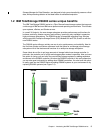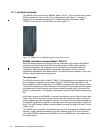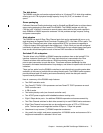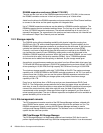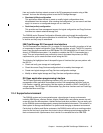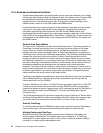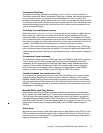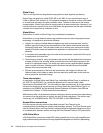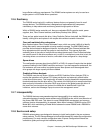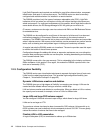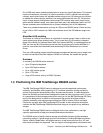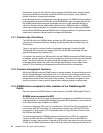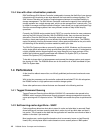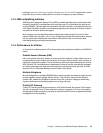
Chapter 1. Introducing the IBM TotalStorage DS6000 series 13
large zSeries resiliency requirements. The DS6000 series systems can only be used as a
target system in z/OS Global Mirror operations.
1.2.6 Resiliency
The DS6000 series has built in resiliency features that are not generally found in small
storage devices. The DS6000 series is designed and implemented with component
redundancy to help reduce and avoid many potential single points of failure.
Within a DS6000 series controller unit, there are redundant RAID controller cards, power
supplies, fans, Fibre Channel switches, and Battery Backup Units (BBUs).
There are four paths to each disk drive. Using Predictive Failure Analysis®, the DS6000 can
identify a failing drive and replace it with a spare drive without customer interaction.
Four path switched drive subsystem
Most vendors feature Fibre Channel Arbitrated Loops, which can make it difficult to identify
failing disks and is more susceptible to losing access to storage. The IBM DS6000 series
provides dual active/active design architecture, including dual Fibre Channel switched disk
drive subsystems which provide four paths to each disk drive. This ensures high data
availability even in the event of multiple failures along the data path. Fibre Channel switches
are used for each 16 disk drive enclosure unit, so that if a connection to one drive is lost, the
remaining drives can continue to function, unlike disk drives configured in a loop design.
Spare drives
The configuration process when forming RAID-5 or RAID-10 arrays will require that two global
spares are defined in the DS6800 controller enclosure. If you have expansion enclosures, the
first enclosure will have another two global spares. More spares could be assigned when
drive groups with larger capacity drives are added.
Predictive Failure Analysis
The DS6800 uses the well known (xSeries and ESS) Predictive Failure Analysis (PFA) to
monitor the operations of its drives. PFA takes pre-emptive and automatic actions before
critical drive failures occur. This functionality is based on a policy-based disk responsiveness
threshold and takes the disk drive offline. The content of the failing drive is reconstructed from
data and parity information of the other RAID array drives on the global spare disk drive. At
the same time, service alerts are invoked, the failed disk is identified with Light Path
indicators, and an alert Message Popup occurs on the management server.
1.2.7 Interoperability
The DS6800 features unsurpassed enterprise interoperability for a modular storage
subsystem because it uses the same software as the DS8000 series, which is an extension of
the proven IBM ESS code. This allows for cross-DS6000/8000 management and common
software function interoperability, for example, Metro Mirror between a DS6000 and an ESS
Model 800, while maintaining a Global Mirror between the same DS6000 and a DS8000 for
some other volumes.
1.2.8 Service and setup
DS6000 series systems are designed to be easy to install and maintain; they are customer
setup products. The DS Storage Manager’s intuitive Web-based GUI makes the configuration
process easy. For most common configuration tasks, Express Configuration Wizards are
available to guide you through the installation process.



